7 Best Free Cell Biology Courses for 2024: What Really Happens Inside Our Cells?
Learn about processes involved in respiration and photosynthesis, DNA, RNA, and protein synthesis, ATP and energy, and intra-cellular structures and organelles.
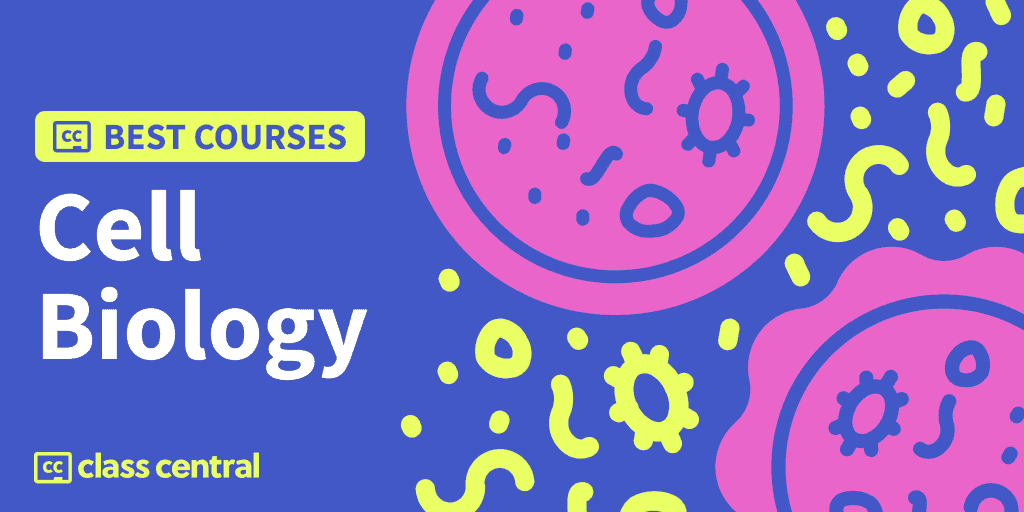
Biology was my favorite subject in senior high school. The thought of every living thing being made up of microscopic cells was mind-blowing. And what exactly happens inside those cells is simply amazing. Some courses in this Best Courses Guide (BCG) explain the structure and functions of the various cell components while others go more deeply into the chemical reactions that happen inside cells.
If you’re interested in cell biology, there’s a course for you. We’ve collated information from over 1000 biology courses, ratings, and reviews to narrow down the best choices for you.
For related subjects, see our Genetics, Anatomy, and Physiology BCGs.
Click on the shortcuts for more details:
Here are our top picks
| Course Highlight | Workload |
| Best Cell Biology Course (MIT) | 24-36 hours |
| Best Cell Biology Course with Free Certificate (Saylor Academy) | 35 hours |
| Best Molecular Biology Course (MIT) | 36-54 hours |
| Best Chemical Biology Course (University of Geneva) | 21 hours |
| Best Free Course About Molecular Techniques (Shomu’s Biology) | 13 hours |
| Best Overview of Cells with Free Certificate (The Open University) | 12 hours |
| Best Short Tour of Cell Structure (Ninja Nerd) | >1 hour |
BCG Stats
- All courses are free or free-to-audit
- 2 courses have a free certificate of completion and 3 others offer a paid certificate
- The 7 courses have around 100K enrollments and more than 1.2M views altogether.
Best Cell Biology Course
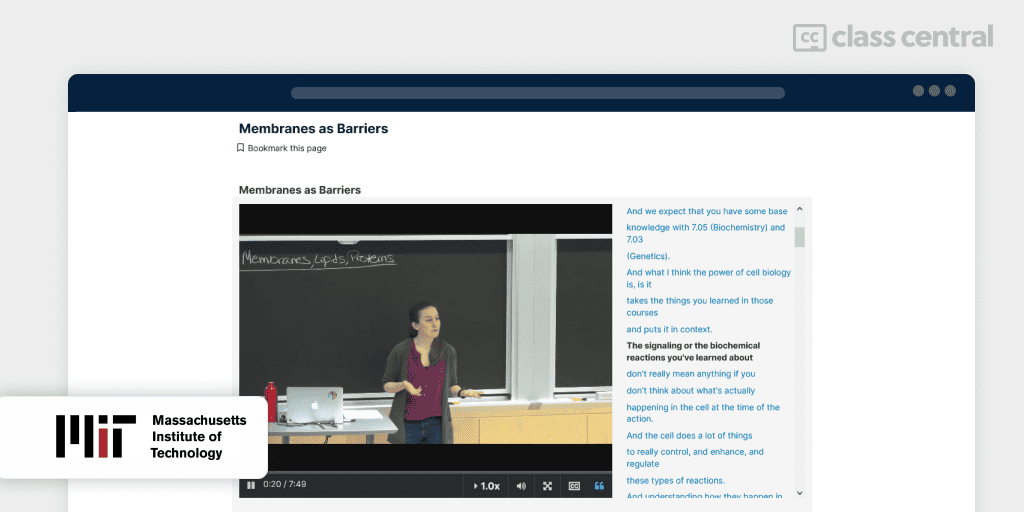
Cell Biology: Transport and Signaling is part of MIT’s Cell Biology course series. The instructors recommend learners complete Introduction to Biology – The Secret of Life and Biochemistry: Biomolecules, Methods, and Mechanisms first. Here, you’ll find a comprehensive discussion of biology at an experimental level. You will learn to:
- Develop your scientific thinking skills
- Apply biochemical and genetic methods for cell transport and signaling
- Evaluate scientific conclusions and models
- Choose appropriate methods for specific research questions and design experiments with proper controls
- Assess biological necessity and sufficiency from results
- Compare protein transport and signaling pathways
- Identify recurring themes in protein transport and signal transduction
The other highly-rated courses in the cell biology series are:
- Cell Biology: The Cytoskeleton and Cell Cycle (28-42 hours)
- Cell Biology: Cell-Cell Interactions (28-42 hours)
“…I love the MIT bio courses, so I’m happy to see this is the first of what will be a … series in cell biology…” – Karen Carlson.
| Course | Cell Biology: Transport and Signaling |
| Provider | edX |
| University | Massachusetts Institute of Technology |
| Instructors | Frank Solomon, Rebecca Lamason, Mary Ellen Wiltrout, Darcy Gordon and Monika Avello |
| Time Commitment | 24-36 hours |
| Enrollment | >8K |
| Class Central Rating | 4.9 |
| Cost | Free audit |
| Certificate | Paid |
Best Cell Biology Course with Free Certificate
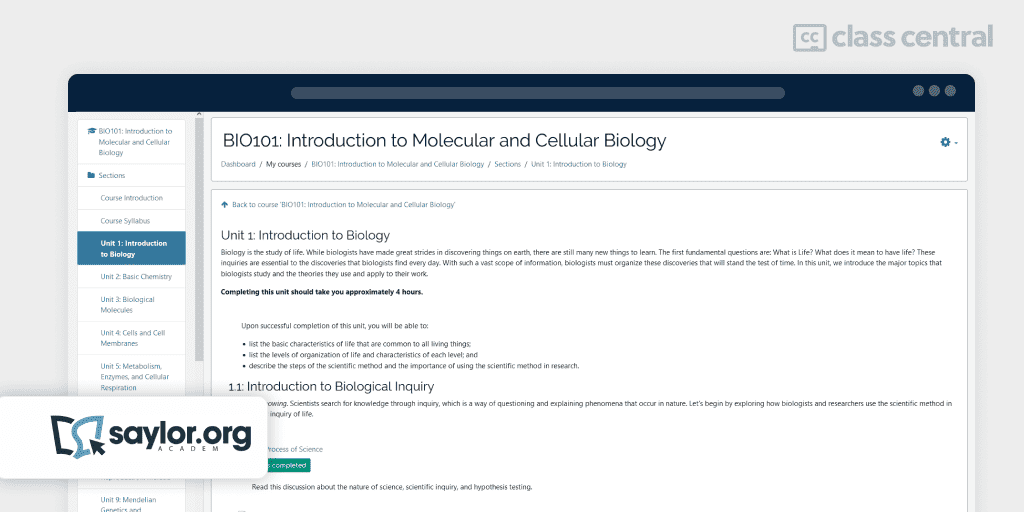
Saylor Academy offers a free certificate if you pass the final exam in BIO101: Introduction to Molecular and Cellular Biology. Or if you are enrolled in a partner college or university, you can pay a small fee to take the proctored exam and add the subject to your academic record (check with your institution). Topics covered:
- Introduction to biology, chemistry, and biological molecules
- Cells and cell membranes
- Metabolism, enzymes, cellular respiration, and photosynthesis
- Cellular reproduction: mitosis and meiosis
- Mendelian genetics, chromosomes, and gene expression
| Course | BIO101: Introduction to Molecular and Cellular Biology |
| Provider | Saylor Academy |
| Time Commitment | 35 hours |
| Cost | Free |
| Certificate | Free |
Best Molecular Biology Course

Molecular Biology – Part 1: DNA Replication and Repair is in Class Central’s Best Online Courses of All Time list. The instructors recommend learners complete Introduction to Biology – The Secret of Life and Biochemistry: Biomolecules, Methods, and Mechanisms first. You will learn:
- That our cells synthesize enough DNA in a lifetime to stretch a lightyear
- How cellular machinery prevents DNA synthesis errors and cancer
- How two meters of DNA material is compacted within the cell nucleus
- Beyond textbook knowledge, explore scientific deduction of molecular models
- Molecular genetics, from classic experiments to genome sequencing
- How to design molecular biology experiments and data analysis
- The limits of knowledge about DNA replication machinery and fidelity pathways
Other courses in this popular series are:
- Molecular Biology – Part 2: Transcription and Transposition (28-56 hours)
- Molecular Biology – Part 3: RNA Processing and Translation (32-64 hours)
“The quality course is really amazing, especially the animations, that help to understand concepts that could be quite hard to grasp any other way…” – Javier Pizarro.
| Course | Molecular Biology – Part 1: DNA Replication and Repair |
| Provider | edX |
| Institution | Massachusetts Institute of Technology |
| Instructors | Tania A. Baker and Stephen P. Bell |
| Time Commitment | 36-54 hours |
| Enrollment | >69K |
| Class Central Rating | 4.8 |
| Cost | Free audit |
| Certificate | Paid |
Best Chemical Biology Course
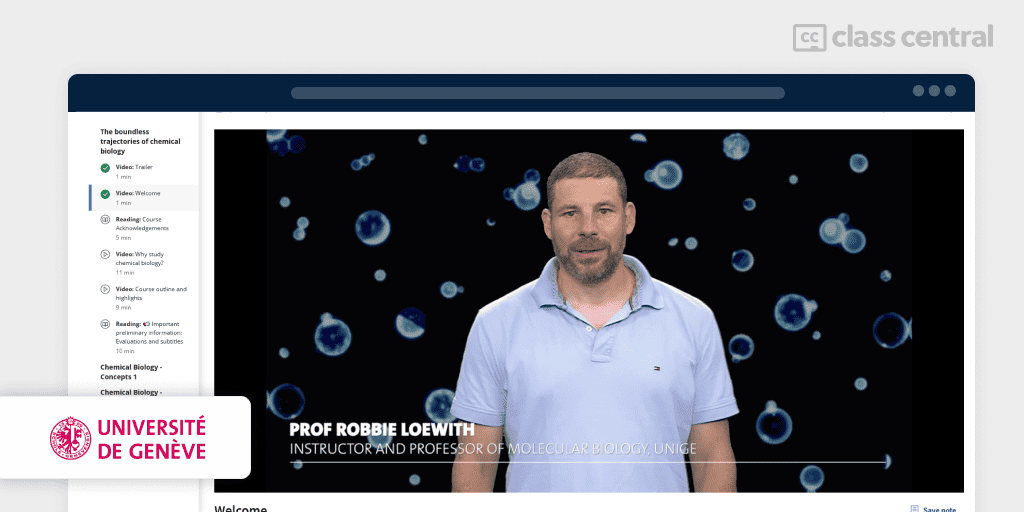
Molecules that make up living things are governed by the laws of physics and chemistry. Chemical Biology particularly explores the chemical aspects, while mentioning that cooperation and communication between scientists in different fields are essential for optimum knowledge. You will learn how to:
- Explore the significance of chemical biology
- Use microscopy and fluorophores for detailed observations and cellular visualization
- Employ fluorescent techniques for real-time measurement, focusing on chromatin regulation and membrane tension
- Utilize modified protein domains for custom functions with light-based readout
- Harness light-induced chemistry to control biology (e.g., remote control, inhibition)
- Address the complexity of biology and discuss screening methods for molecules and target identification in cells and in vitro.
“…that’s one of the benefits of MOOCs: you can take a class that’s a little beyond your grasp, take away as much as you can, and save the rest…” – Karen Carlson.
| Course | Chemical Biology |
| Provider | Coursera |
| University | University of Geneva |
| Instructor | Robbie Loewith and Marcus J. C. Long |
| Time Commitment | 21 hours |
| Enrollment | >21K |
| Provider Rating | 4.7 |
| Cost | Free Audit |
| Certificate | Paid |
Best Free Course About Molecular Techniques
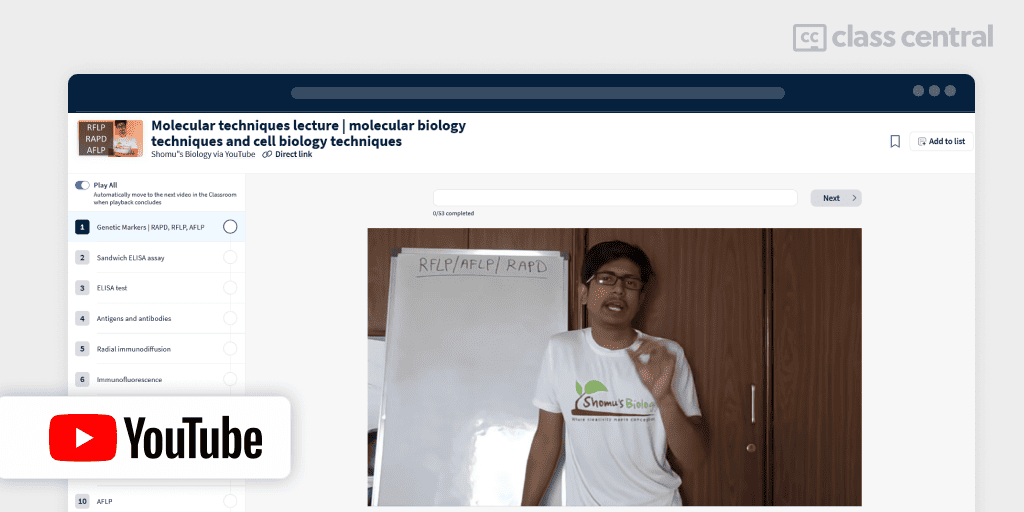
Shomu Bhattacharjee of Shomu’s Biology teaches us about genetic markers, vaccines, and molecular biology techniques in Molecular techniques lecture | cell biology techniques. Learn about:
- Genetic markers: RAPD, RFLP, AFLP
- Antigens and antibodies including ELISA test
- Radial immunodiffusion, immunofluorescence, complement fixation test, and quorum sensing in bacteria
- PCR (polymerase chain reaction) in detail
- DNA sequencing and repair mechanism – base excision repair, mismatch repair
- miRNA biogenesis and microRNA mechanism
- RNAi mechanism: RNA interference pathway using siRNA (short interfering RNA mediated gene silencing) and shRNA (short hairpin RNA mediated knockdown and gene silencing)
- HIV life cycle and vaccine
- Gene therapy basics both in vivo and ex vivo, cancer immunotherapy
- Types of vaccines
- Plant biotechnology and transgenic animals
I would recommend checking the order of the videos when watching the series, as some appear to have been uploaded out of order.
“Your videos are amazing! So helpful. Thanks” – rosefinch3759, YouTube learner.
| Course | Molecular techniques lecture | molecular biology techniques and cell biology techniques |
| Provider | YouTube |
| Institution | Shomu’s Biology |
| Instructor | Shomu Bhattacharjee |
| Time Commitment | 13 hours |
| Views | >75K (first video has >390K views) |
| Cost | Free |
| Certificate | No |
Best Overview of Cells with Free Certificate
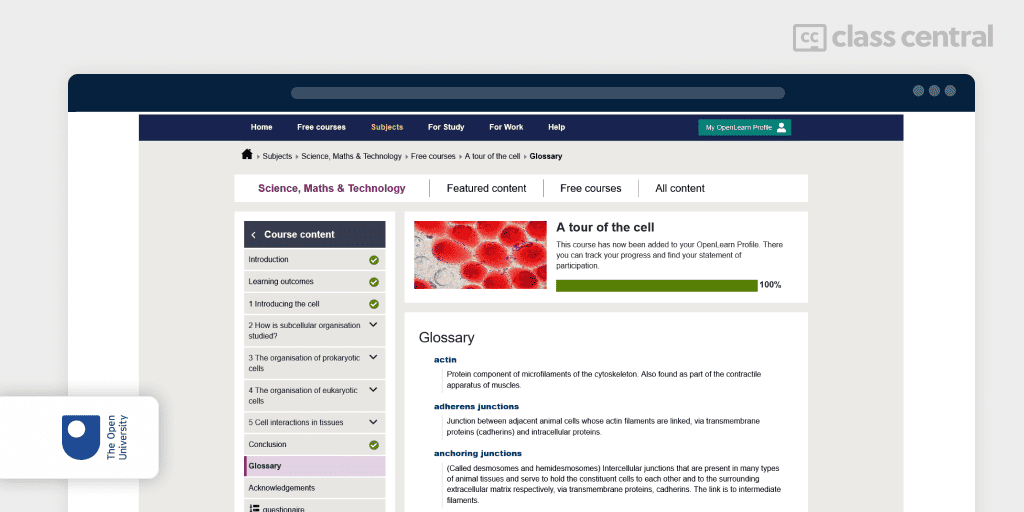
A tour of the cell from OpenLearn, is an intermediate level, text-based course offering a free certificate. Although there are no videos, the many images and diagrams are clearly labeled, and the glossary is useful, particularly if you are unfamiliar with the terms used. You will learn about:
- Techniques for studying cells including electron and transmission electron microscopy, cell fractionation, and centrifugation
- Prokaryotic and eukaryotic cells
- Cell structures: surfaces, cytoskeleton, microfilaments, microtubules, nucleus and nucleolus
- Protein synthesis and secretion, transport of molecules
- Ribosomes, endoplasmic reticulum, Golgi apparatus, mitochondria, chloroplasts and vacuoles
- Extracellular matrix, cell interactions in tissues, and cell junctions.
“…The lessons are taught in a clear and fluent way and the pictures help to understand better…” – Foroogh Yousefi.
| Course | A tour of the cell |
| Provider | OpenLearn |
| Institution | The Open University |
| Time Commitment | 12 hours |
| Class Central Rating | 5.0 |
| Cost | Free |
| Certificate | Free |
Best Short Tour of Cell Structure
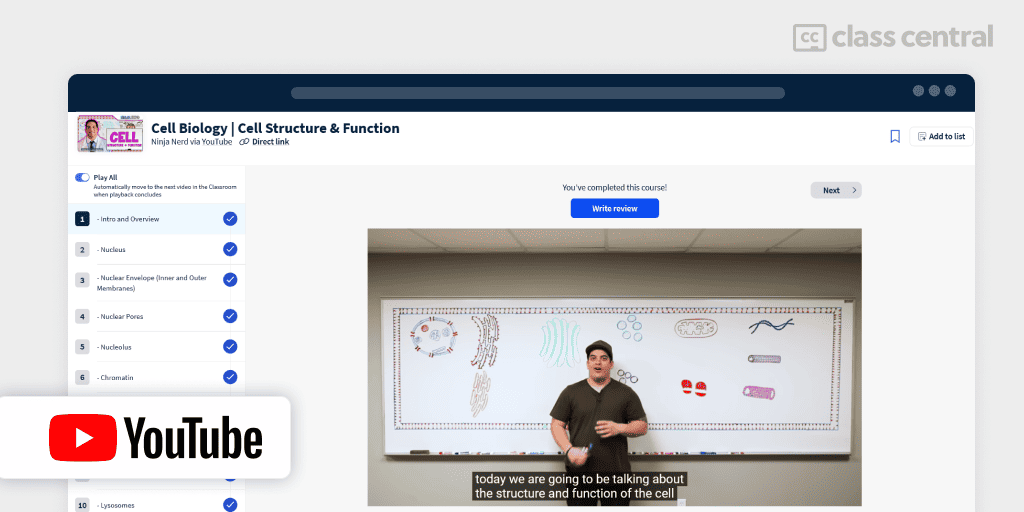
In Cell Biology | Cell Structure & Function, the ever-enthusiastic Zach Murphy (Ninja Nerd) will take you on a quick tour of the cell, explaining the function of each component along the way. You will learn about:
- The nucleus and nucleolus, nuclear envelope, and nuclear pores
- Chromatin
- Rough and smooth endoplasmic reticulum (ER) and Golgi apparatus
- Cell membrane, lysosomes, peroxisomes, and mitochondria
- Free and membrane-bound ribosomes
- Actin, intermediate filaments, and microtubules that make up the cytoskeleton.
“Excellent, detailed to the right degree. Very well-presented as well. I will definitely watch the other lessons in this series. ” – Charles McDonald.
| Course | Cell Biology | Cell Structure & Function |
| Provider | YouTube |
| Institution | Ninja Nerd |
| Instructor | Zach Murphy |
| Time Commitment | < 1 hour |
| Views | >900K |
| Class Central Rating | 5.0 |
| Cost | Free |
| Certificate | No |
Why You Should Trust Us
Class Central, a Tripadvisor for online education, has helped 60 million learners find their next course. We’ve been combing through online education for more than a decade to aggregate a catalog of over 200,000 online courses and 200,000 reviews written by our users. And we’re online learners ourselves: combined, the Class Central team has completed over 400 online courses, including online degrees.
I’ve personally completed over 150 online courses in a variety of topics including biology.
How We Made Our Picks and Tested Them
Trying to find “the best” can be daunting, even for those of us who live and breathe online courses. Here’s how I approached this task.
First, I combed through Class Central’s Catalog and the internet to find a variety of free and paid open courses, some with certificates. You don’t need to enroll in a university to learn cell biology.
Second, when choosing courses, I considered the following factors:
- Renowned Institutions: I started with the most recognized institutions in cell biology.
- Instructor experience: I looked for instructors with extensive experience in cell biology and a variety of presentation styles.
- Course content: I looked for courses that covered a range of topics, from the basics to more advanced.
- Learner reviews: I read learner reviews (when available) to get a sense of the quality of each course, leveraging the Class Central database with its thousands of course ratings and reviews written by our users as well as available course provider ratings.
I also watched some course videos and read the course syllabus.
Then, I defined the scope for these recommendations. A cell biology course can cover various topics, so I chose top courses from a range of sub-fields.
Ultimately, I used a combination of data and my own judgment to make these picks. I’m confident these recommendations will be a reliable way to learn cell biology.






